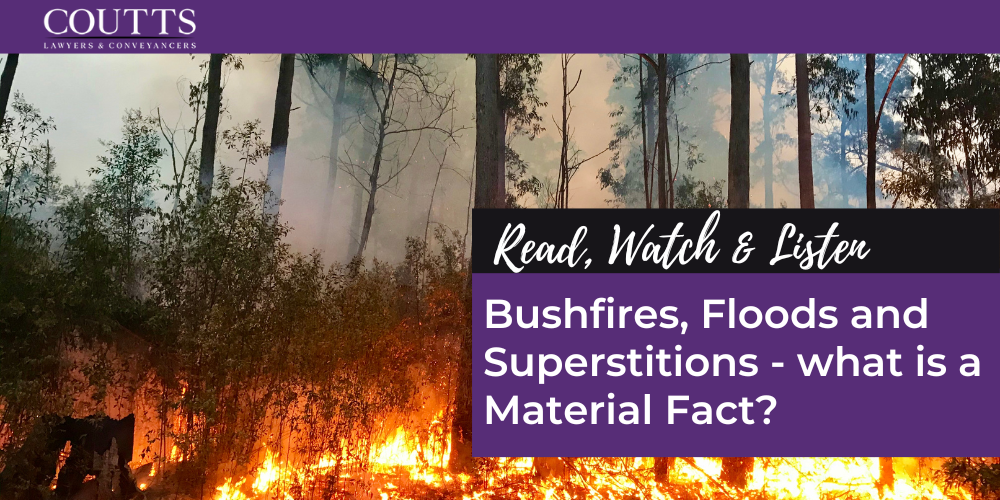On 23 March 2020, amendments to the Property, Stock and Business Agents Act 2002 will commence. One aspect of these amendments relate to what agent’s disclose to prospective buyers about the property. This will go a long way to stopping important information from being withheld, like in the case of the Gonzales house murders in 2001.
KEY TAKE OUTS:
- Agents should be mindful about the statements, representations or promises they make in relation to a property that are selling on behalf of a vendor
- Amendments are being made to the Property, Stock and Business Agents Act 2002 in relation to disclosures and the definition of a material fact
- Vendors must make material facts known to the agents, as agent’s are liable for non-disclosure
In the past…
Under the Property, Stock and Business Agents Act 2002 (the Act), historically agents have had to been mindful about the statements, representations or promises they make in relation to a property that are selling on behalf of a vendor. This is of importance if the statements, representations or promises made are false, misleading, deceptive or concealment of a ‘material fact’, whether it induces someone into buying the property or not.
The point which has been unclear in the past is what is a material fact, as generally speaking what is important to one person, such as superstitious or cultural beliefs, may not be important to another. As such, the Real Estate Institute of NSW (REINSW) has been lobbying the NSW Government for clarity, consistency and certainty in this respect. The NSW Government has acknowledged this need and the Act is being amended.
In the case of the Gonzales house, the agents originally sold the property to a Taiwanese couple who were not told about the history. Once they were advised they decided not to proceed with the purchase, as it was a cultural and religious issue for them personally.
What is a material fact?
As of 23 March 2020 Clause 54 of the Act will come into effect. Under this clause the definition of a material fact which must be disclosed by an agent is as follows:
- The property has flooded from a natural weather event or was affected by bush fire in the last 5 years;
- The property holds a significant health or safety risk;
- The property is listed on the loose-fill asbestos insulation register;
- The property has been the scene of a crime of murder or manslaughter in the last 5 years;
- The property has been used for the production or supply of a prohibited drug or plant in the last 2 years; or
- The property is, or is part of, a building that contains external combustible cladding, where a fire safety order, building product rectification order or development application has been issued or a notice of intention has been issued.
These are significant issues of which the general public would want to know this information before entering discussions to purchase a property. Needless to say superstitious or cultural beliefs did not make the list on this occasion.
Whose responsibility is it to inform the agent?
The vendor is required to make details of the above facts known to the agent at the time of entering into an Agency Agreement.
REINSW has addressed this by inserting a clause into the Agency Agreement which imposes an obligation on the vendor to disclose material facts such as those noted above. It also provides an acknowledgement from the vendor that these material facts will be disclosed to potential buyers.
However, it remains important that the agent informs themselves about the property and any relevant material facts that may not have been disclosed. In the event of a high profile issue, agents should make themselves aware of the history even if the vendors do not advise them. The murders of the Gonzales family were well known by the local community and it could be reasonably expected that the agent’s were aware and simply did not disclose the facts to the purchasers.
Who is liable if a material fact is not disclosed?
The agent is liable for non-disclosure. This includes whether they simply fail to disclose the facts, even if they did not intend to conceal them.
If the agent knew or should have reasonably known about the facts then they are required to disclose to a prospective purchaser. The agents who did not disclose the history of the Gonzales’ house to the Taiwanese couple were fined for their non-disclosure.
What next?
Changes such as this definition provide clarity, consistency and certainty for agents in carrying out their responsibilities. This amendment also provides guidance for purchasers in relation to what they can expect from agents, setting up the groundwork for trust and transparency in their dealings with agents.
Going forward there is no uncertainty about what is expected of agents in relation to marketing properties, therefore situations such as the original sale of the Gonzales house should not occur in the future. If they do, the agent will face the appropriate penalties.
For further information please don’t hesitate to contact Coutts Lawyers.
This blog is merely general and non-specific information on the subject matter and is not and should not be considered or relied on as legal advice. Coutts is not responsible for any cost, expense, loss or liability whatsoever to this blog, including all or any reliance on this blog or use or application of this blog by you.



